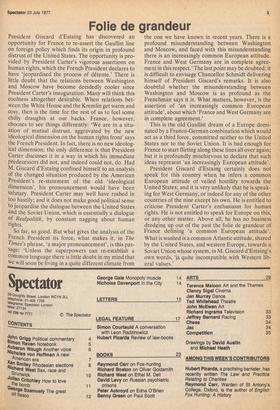Folie de grandeur
President Giscard d'Estaing has discovered an opportunity for France to re-assert the Gaullist line on foreign policy which finds its origin in profound distrust of the United States. The opportunity is provided by President Carter's vigorous assertions on human rights, which the French President declares to have `jeopardised the process of détente.' There is
• little doubt that the relations between Washington and Moscow have become decidedly cooler since President Carter's inauguration. Many will think this coolness altogether desirable. When relations between the White House and the Kremlin get warm and cosy, then is the time for the rest of us to feel some chilly draughts at our backs. France, however,
• chooses to see things differently: `We are in a situation of mutual distrust, aggravated by the new ideological dimension on the human rights front' says the French President. In fact, there is no new ideological dimension; the only difference is that President Carter discusses it in a way in which his immediate predecessors did not, and indeed could not, do. Had M. Giscard d'Estaing confined himself to an analysis of the changed situation produced by the American President's re-statement of the old `ideological dimension', his pronouncement would have been salutary. President Carter may well have rushed in too hastily; and it does not make good political sense to jeopardise the dialogue between the United States and the Soviet Union, which is essentially a dialogue of Realpolitik, by constant nagging about human rights.
So far, so good. But what gives the analysis of the French President its force, what makes it, in The Times's phrase, `a major pronouncement', is this passage: 'Unless the superpowers can re-establish a Common language there is little doubt in my mind that vve will soon be living in a quite different climate from
the one we have known in recent years. There is a profound misunderstanding between Washington and Moscow, and faced with this misunderstanding there is an increasingly common European attitude. France and West Germany are in complete agreement in this respect.' The last point may be doubted: it is difficult to envisage Chancellor Schmidt delivering himself of President Giscard's remarks. It is also doubtful whether the misunderstanding between Washington and Moscow is as profound as the Frenchman says it is. What matters, however, is the assertion of `an increasingly common European attitude', about which 'France and West Germany are in complete agreement.'
This is the old Gaullist dream of a Europe dominated by a Franco-German combination which would act as a third force, committed neither to the United States nor to the Soviet Union. It is bad enough for France to start flirting along these lines all over again but it is profoundly mischievous to declare that such ideas represent `an increasingly European attitude'.
President Giscard d'Estaing certainly does not speak for this country when he infers a common European attitude of veiled hostility towards the United States; and it is very unlikely that he is speaking for West Germany, or indeed for any of the other countries of the nine except his own. He is entitled to criticise President Carter's enthusiasm for human rights. He is not entitled to speak for Europe on this, or any other matter. Above all, he has no business dredging up out of the past the folie de grandeur of France defining 'a common European attitude'. What is wanted is a common Atlantic attitude, shared by the United States, and western Europe, towards a Soviet Union whose system, in M. Giscard d'Estaing's own words, 'is quite incompatible with Western liberal values.'






































 Previous page
Previous page